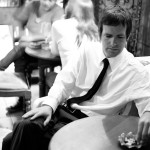[Portrait by Schiko; Live Photo by Sarah Meyfroi]
By J. Bennett
To the casual listener, it might seem like Mayer Hawthorne sprang fully formed from the afro of some ancient R&B god, dropping sweet, sweet falsetto and playing almost all the instruments on his debut LP, A Strange Arrangement. That’s the impression we got after listening to the album on psychotic repeat when it came out back in September, and we’ve been listening to it that way ever since. A deliriously infectious platter of seemingly vintage soul that drips Motown and Courvoisier at every turn, it’s made enthusiastic converts of everyone from Justin Timberlake and John Mayer to Snoop Dogg and Ghostface Killah.
As it turns out, Hawthorne isn’t black or old. He’s a nice young Jewish boy from Ann Arbor, Michigan–a white boy who used to spin hip-hop at parties and cut records with local hip-hop crew the Athletic Mic League under the name DJ Haircut before moving to Los Angeles, where his secret soul persona was ‘discovered’ by Stones Throw‘s main man Peanut Butter Wolf.
self-titled caught up with Hawthorne on the New Orleans stop of his first-ever US tour.
You’ve done a bunch of hip-hop stuff in the past. Why did your first full-length as a solo artist end up being a soul record?
Soul was never my plan. I wanted to make hip-hop music. But Peanut Butter Wolf heard some of my soul demos, and he flipped out. He asked me if I would record an album of it for Stones Throw. I never even had any plans to record a full album, but it was a great opportunity to work with one of my favorite labels, so I figured what the hell.
Tell us a little about your hip-hop crew, the Athletic Mic League.
The Athletic Mic League is a seven-man crew from Ann Arbor. We all went to school together. We all played sports; that’s why we were the Athletic Mic League. I made a couple albums with them and we got signed to Barak Records, Slum Village’s label. I’m still a part of the Athletic Mic League, but I also branched off and became a part of another hip-hop crew called Now On, and Now On was more soulful and electronic, but it was still hip-hop based. That’s who I ended up moving to Los Angeles with, and that’s how I ended up meeting Peanut Butter Wolf.
Is there a difference between your hip-hop persona and your soul persona?
It’s all me, man. I’m only one guy. I’m a terrible actor, so if I tried to pretend like I was some other dude, I don’t think it would be believable at all. It’s all just different sides of Andrew Cohen.
When did you become Mayer Hawthorne?
Well, Mayer Hawthorne is my porn-star name–my middle name and the street that I grew up on in Michigan–and it was just a name to give to my soul project that I was doing for fun at the time. I didn’t take it very seriously. I never expected those songs to be released to the public or heard. I would just play ’em for my family and friends.
When did you first figure out that you could sing?
[Laughs] I don’t even know that I’ve really figured that out yet.
Well, when did you first get the confidence to do it?
I guess it was when Peanut Butter Wolf said that he liked my songs. But even then, nobody–including myself, Peanut Butter Wolf, my family and my management company–ever expected that this project would explode like it did. Even when I signed to Stones Throw to record an album, I never anticipated that people like Justin Timberlake and John Mayer would be listening or even paying attention.
How did it come to your attention that those people were listening?
Most of it came from Twitter. Both John Mayer and Justin Timberlake sent out messages on Twitter about me.
Do you foresee any high-profile collaborations in your future?
Yeah, we’ve been contacted by Snoop Dogg’s people, and I just talked to Ghostface Killah the other day. We’re doing a couple shows with him on this tour, and he wants to do some tracks. So hopefully that’ll work out. We’ll see.
“We’ve been getting 40 to 50 percent women at Mayer Hawthorne shows, which is staggering.”
You play most of the instruments on A Strange Arrangement. Do you have an orchestral mind? Can you hear all those parts as you’re writing?
Yeah, I hear everything all at once, usually–the drums, the bass patterns, the strings, even the words. The challenge is getting it out of my head and on tape and getting it to sound like it does in my head. The horn parts, too: I played the clarinet and saxophone a little bit in middle school, but I brought in the heavy hitters for that. I’ve got a family of fantastic musicians who play the horns for me, but I write and arrange the parts.
In another interview you did, you mentioned that the way you remember bits for songs is by singing them into your voice mail:
Yeah, I’ve sort of upgraded now. I’ve got a voice memo thing for my phone, so I don’t have to call my voice mail anymore. But I still sing stuff into my phone and generally people look at me really strangely when I’m doing it because you never know when it’s gonna happen.
Have you given any thought to releasing those recordings as hidden tracks at the end of a CD?
[Laughs] They generally don’t really make much sense. I don’t think anybody would be able to make heads or tails of my voice memos. But who knows? Maybe I’ll put out a compilation of them one day. I do save them all.
One of the songs on your record –“Maybe So, Maybe No‖is a cover song written by a guy named T. Hester. Is it the same dude who wrote songs for the Dramatics in the ’60s and ’70s?
Yeah, same guy, same guy. “Maybe So, Maybe No†is a Detroit record by a group called the New Holidays and produced by a guy named Popcorn Wylie, who produced a lot of incredible records and made his own solo records, too. Same with Tony Hester–he’s a legendary Detroit songwriter. It was hard to do a cover of that song because the original is so great.
You took full advantage of your new hometown with the skateboarding video you did for that song.
Yeah, we had no budget for that video, no treatment. I just called up my buddy Hank DeMaio, who did the first video (“Just Ain’t Gonna Work Outâ€) for me. For months we were talking to skate companies to try and do a real big-budget skate video for it, but everyone was just kinda dragging their heels and nothing was getting done, so finally I just called Hank and was like, “Let’s go down to Venice Beach this weekend and just go shoot a bunch of fun shit.†And that’s what we did.
Are you much of a skater?
I skate everyday, but I’m not a very good skater. I can’t do tricks or anything. I just do it mostly for transportation because I hate driving in L.A. I brought my skateboard on tour, too. I miss it when I’m not on it. I wish I had the time and discipline to be a great skateboarder, but I’m not by any stretch of the imagination.
Do you plan to do any more of those barbershop quartet videos?
Oh, that was just me and my band, The County. We did that in 15 minutes. We shot it in one take. We were just being fun and spontaneous, and I really think that’s a big part of the success of this project. Like I wanted to press my first single on a red heart-shaped record because it was somethin’ dope to do for record collectors like me. We didn’t think about how much money we were gonna make or if it would be difficult to do. We just did it because it was fun.
Are you a soul vinyl junkie?
I’m more like a vinyl junkie, period. I have just as many rock and reggae and electronic and hip-hop records as I do soul records. I have a ton of jazz, too. I try to keep it well-rounded. I mean, I used to be a metalhead. I used to listen to Helmet and Iron Maiden and Ozzy Osbourne. I also love stuff like Fugazi and The Police and the Smashing Pumpkins. I’m currently addicted to this Norwegian singer named Hanne Hukkelberg. I listen to everything, man. It’s definitely not all soul.
You’ve done some touring in Europe. Do you find that Europeans have a different relationship with soul music than Americans?
I don’t know if it’s a different relationship, but I think Americans a lot of times–especially Detroiters and cats from Chicago and other places that have a significant soul history–I think they kinda take it for granted. They’re just so used to having it in their lives that sometimes they don’t appreciate it as much as people in Europe, who didn’t have that established soul history.
What’s your groupie situation like?
There’s been some of that. [Laughs] It’s been pretty crazy out here on the road. We’ve been getting 40 to 50 percent women at Mayer Hawthorne shows, which is staggering. It rarely, rarely happens like that for any artist. But I’m not complaining at all. It could be worse.
Mayer Hawthorne would like you to follow his every move at twitter.com/mayerhawthorne




